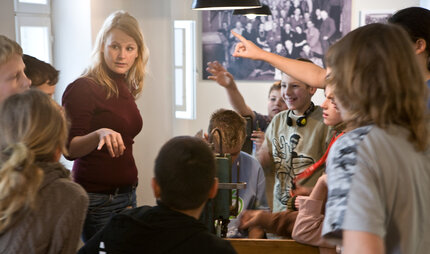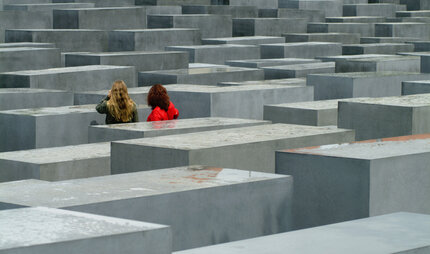Anne Frank Zentrum
All about Anne
Who was Anne Frank? At Berlin’s Anne Frank Zentrum you can learn more about a girl who was full of ideas, hopes and dreams - her famous diary is the focus of the exhibition.
At Berlin’s Anne Frank Zentrum you can learn more about a girl who was full of ideas, hopes and dreams - her famous diary is the focus of the exhibition.

“The world will still keep on turning without me; what is going to happen, will happen, and anyway it’s no good to resist. I’ll just let matters take their course and concentrate on studying and hope that everything will be all right in the end.” Anne Frank wrote this on February 3, 1944, just a few months before her deportation. The sentences are a testament to the fascination and tragedy of this young girl’s story. Her thoughts and hopes are still relevant to young people today. The exhibition All About Anne addresses this in a unique way. It is the only exhibition on the history of Nazi rule in Berlin that is specifically aimed at children, young people and families.
An exhibition with an interactive, hands-on atmosphere

The courtyard at Hackeschen Markt is adorned with colourful street art on all sides. A graffiti artwork of the young Anne Frank looks back at you with a smile. This is where you’ll find the entrance to Berlin’s Anne Frank Zentrum. The idea for the centre was born in 1994 on the 50th anniversary of the liberation from Fascism. At first, the founding association only exhibited a touring exhibition. Then, four years later, a permanent centre opened, as a partner of Anne Frank House in Amsterdam. It has been located not far from Hackescher Markt since 2002.
The All About Anne exhibition, which opened in November 2018, commemorates the life of Anne Frank. It is a place of learning about the history of National Socialism. Anne Frank is one of the most famous victims of the Holocaust. A visit of the field of stelae created as a Memorial to the Murdered Jews of Europe gives you a sense of the tremendousness of the extent of holocaust.
The Jewish girl hid from the Nazis in a secret annex in Amsterdam along with her parents Otto and Edith, her sister Margot and four other people being persecuted by the Nazis. They were discovered after two years. Anne Frank died in 1945 in the Bergen-Belsen concentration camp as a result of her imprisonment. After her death, her diary became world famous. Frequently asked questions are answered in the entrance area of the exhibition space and information is also provided about the history of the site and about the work of the Anne Frank Zentrum

The life of Anne Frank
One part of the exhibition is dedicated to the life of Anne Frank. It tells the story of Anne, her family and her friends, as well as her persecution and time in hiding. Six different parts of the museum each show a period of Anne’s life: Anne’s childhood years in Germany (1929-1933), Anne’s new home in the Netherlands (1933-1940), Anne’s life in danger (1940-1942), Anne’s time in hiding (1942-1944), Anne Frank’s last 6 months (1944-1945) and Otto Frank’s return and Anne’s diary (1945-1947). There are several video interviews with contemporary witnesses and tactile objects. Visitors can help shape this exhibition area: There are numerous panels with fascinating detailed information. Visitors can highlight the individual panels that have particular resonance for them.
Past and present
Another part of the exhibition draws connections between Anne Frank’s life and the present day. After all, studying Anne Frank’s biography is a way of coming to terms with the Holocaust, understanding the present and thinking about the future. There are six areas dedicated to this: In the library you can read and write, and familiarise yourself with the diaries of Anne and other people. School groups can perform theatre on the stage and all visitors are invited to watch films or draw and be creative in the workshop. Various forms of remembrance are presented. The archive contains documentation and other research material. You can view reports of anti-Semitic incidents and do further research at the computer stations. You can also add your own thoughts to Anne's chestnut tree.
Highlights of the Anne Frank Zentrum
- Interactive stations: Write letters to the future, read diaries, design memorials and share your own experiences of anti-Semitism.
- Many opportunities for visitors to add to the exhibition and enrich it with their own contributions.
- Numerous videos
- A true-to-the-original copy of Anne Frank’s diary
- Baby photos and class photos of Anne
- PC station with further information and films
- Accessibility features: Lift and wheelchair-accessible design, videos in German sign language, induction loops and digital Roger system, texts in clear language, floor guidance system, tactile objects, audio description and guided tours for blind and visually impaired visitors.
Jewish history in the surrounding area
Directly opposite the Anne Frank Zentrum you will find the Museum Blindenwerkstatt Otto Weidt. The small manufacturing company Weidt once employed Jews here at its Workshop for the Blind, protecting them from persecution. The Old Jewish Cemetery is also marked by the Nazi era. In 1943, the Gestapo destroyed it, and it was not until 2008 that the Jewish community finally reopened it. The New Synagogue foundation houses the Open The Gates exhibition. It displays remains of the old synagogue and other exhibits of Jewish life in Berlin. The monument to the Women’s Protest of 1943, located in Rosenstraße, draws attention to the successful protests of non-Jewish women against the imprisonment of their Jewish husbands. The Neue Wache (New Guardhouse) memorial commemorates the victims of tyranny and war. The Mother with Dead Son sculpture by Käthe Kollwitz has been part of the memorial since its redesign in 1993.
Our tips for your visit
You can easily reach the Anne Frank Zentrum by taking the S-Bahn to the Hackescher Markt station. With the Berlin WelcomeCard you will get a 25% discount on the price of admission. The Berlin Museum Pass grants you free access to the Anne Frank Zentrum as well as many other museums on three consecutive days.
Information for families and children
You can regularly take part in special family tours. For children there is also a discovery booklet with a quiz, including a prize at the end.
Information for school groups
There are lots of offers for school classes and teachers, from exhibition guides to project days and teaching materials. For details, see the Anne Frank Zentrum website.
Opening hours
| Tuesday | |
|---|---|
| Wednesday | |
| Thursday | |
| Friday | |
| Saturday | |
| Sunday |



